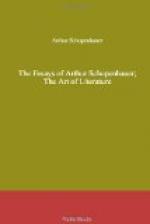The ordinary writer has an unmistakable preference for this style, because it causes the reader to spend time and trouble in understanding that which he would have understood in a moment without it; and this makes it look as though the writer had more depth and intelligence than the reader. This is, indeed, one of those artifices referred to above, by means of which mediocre authors unconsciously, and as it were by instinct, strive to conceal their poverty of thought and give an appearance of the opposite. Their ingenuity in this respect is really astounding.
It is manifestly against all sound reason to put one thought obliquely on top of another, as though both together formed a wooden cross. But this is what is done where a writer interrupts what he has begun to say, for the purpose of inserting some quite alien matter; thus depositing with the reader a meaningless half-sentence, and bidding him keep it until the completion comes. It is much as though a man were to treat his guests by handing them an empty plate, in the hope of something appearing upon it. And commas used for a similar purpose belong to the same family as notes at the foot of the page and parenthesis in the middle of the text; nay, all three differ only in degree. If Demosthenes and Cicero occasionally inserted words by ways of parenthesis, they would have done better to have refrained.
But this style of writing becomes the height of absurdity when the parenthesis are not even fitted into the frame of the sentence, but wedged in so as directly to shatter it. If, for instance, it is an impertinent thing to interrupt another person when he is speaking, it is no less impertinent to interrupt oneself. But all bad, careless, and hasty authors, who scribble with the bread actually before their eyes, use this style of writing six times on a page, and rejoice in it. It consists in—it is advisable to give rule and example together, wherever it is possible—breaking up one phrase in order to glue in another. Nor is it merely out of laziness that they write thus. They do it out of stupidity; they think there is a charming legerete about it; that it gives life to what they say. No doubt there are a few rare cases where such a form of sentence may be pardonable.
Few write in the way in which an architect builds; who, before he sets to work, sketches out his plan, and thinks it over down to its smallest details. Nay, most people write only as though they were playing dominoes; and, as in this game, the pieces are arranged half by design, half by chance, so it is with the sequence and connection of their sentences. They only have an idea of what the general shape of their work will be, and of the aim they set before themselves. Many are ignorant even of this, and write as the coral-insects build; period joins to period, and the Lord only knows what the author means.
Life now-a-days goes at a gallop; and the way in which this affects literature is to make it extremely superficial and slovenly.




